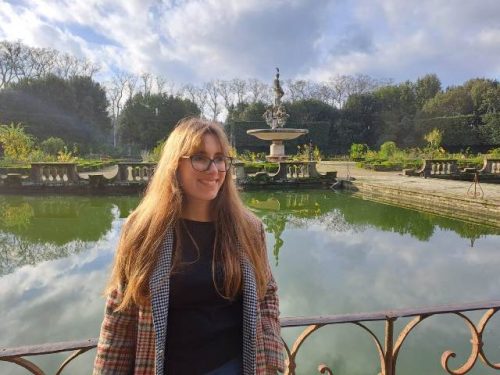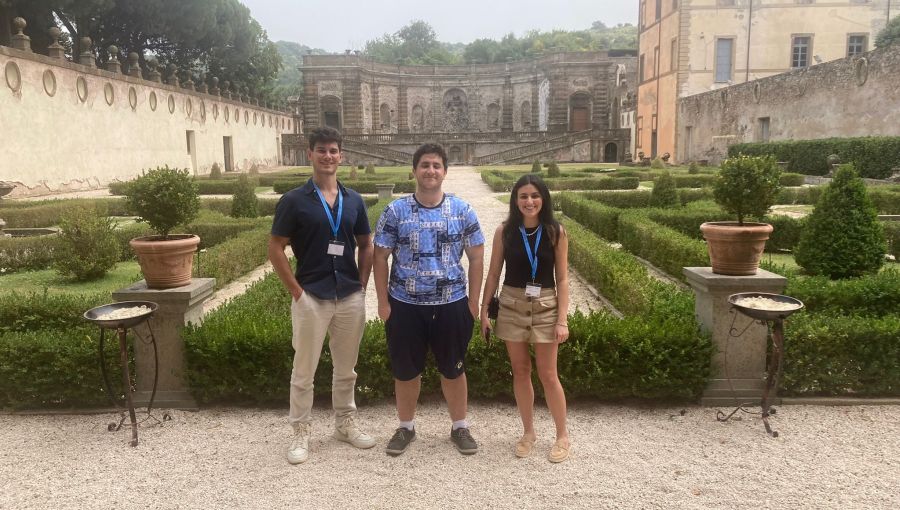Building New Modes of Coexistence: Alumna Marija Rakovic
Marija Rakovic hails from Serbia and graduated from JCU in 2021 with a double B.A. in Communications and International Affairs. She is currently pursuing an M.A. in Transnational Governance at the European University Institute in Florence. Marija recently published “Morse for Dragons,” her first short fiction work.

Marija Rakovic
How’s life after graduation?
The last few semesters I spent at JCU were tense in the wake of the COVID-19 pandemic, and I was haunted by a sense of uncertainty right after graduation. In any case, I still found my way to Florence, where I am now studying Transnational Governance at the European University Institute. The program itself is very challenging and interdisciplinary, and I greatly enjoy it. Likewise, living in Florence is like living in a treasure box; there’s always something new and wonderful waiting around every corner.
Tell us about your background.
I was born in Belgrade, in a chameleon country; one that has changed its name, its borders, and its type of government three times over since I was born. My father passed when I had just turned seventeen, and I felt my own future narrow. I was suddenly and completely aware that whatever I achieved in life, I would have to do so only on my own merit. My mindset, therefore, became a growth mindset: I would need to be my best self every day, and every day I would set the bar a bit higher.
I knew I wanted to go abroad to earn my degree, and JCU was a happy marriage between a good education and being in one of the most beautiful cities in the world. I think I also chose JCU because of how supportive the faculty and staff are. I was accepted on a scholarship, and had to work hard to keep up my grades – but I felt that everyone was full of advice and kind suggestions. In my first semester, I made the Dean’s List – which is awarded each semester to outstanding students – and maintained it in an unbroken streak every semester until my graduation. I graduated magna cum laude.
In my first year, I was also awarded the Marija Govedarica Memorial Scholarship. Marija Govedarica, like myself, was a Serbian alumna who graduated from JCU some time ago. She went on to do an M.A. at Columbia University. One of her greatest wishes in life was to help young people from our region get the education and opportunities she had, and I am grateful and honored to carry her legacy.
What made you decide to double major in Communications and International Affairs?
I first became interested in political theory because of the turbulence and confusion that permeated my home country and my childhood. When I arrived at JCU, I started out in Political Science, but then decided to switch to International Affairs because it had a stronger base in economics. I then decided to double major in Communications and International Affairs because I felt that each discipline built off and deconstructed the other. Where International Affairs would propose theories and build new modes of coexistence, Communications – or Critical Media Theory, which I was most interested in – would evaluate and test them. Pursuing this double major, therefore, gave me a balanced worldview.
You’re currently pursuing an M.A. in Transnational Governance at the European University Institute. How did your experience at JCU help you in your graduate studies?
I believe that the two most important skills JCU taught me were: how to recognize a good practical opportunity, whether it be for an internship or a job, and how to organize my life so that I could enjoy both my work and my leisure. Put in a different way: while at JCU, I had to juggle my studies with my internships and my part-time job. This made me develop strong time-management and communication skills. Instead of being overwhelmed, I felt a sense of purpose in my work. I think this stability and faith in myself is the most important thing I could have ever learned.
What classes and/or professors impacted you the most and why?
There are many professors at JCU that I would like to thank, in particular Professor Camil Roman. He instilled in me an enduring passion for the study of transformative social processes. It was due to his influence that, for my capstone project, I wrote about the social history of protest movements and protest culture in the Balkans since the 1990s, and how it affects collective action today.
Other professors I would like to thank are Professor Vanda Wilcox and Professor Gene Ogle, who both teach in the History and Humanities Department. Professor Wilcox’s course on History, Memory, and Popular Culture greatly helped me to better understand how historical memory informs identity, national memory, and political debates today. Professor Ogle’s course, The Problem of Slavery in Western Culture, focused on how ideas of democracy and slavery evolved simultaneously throughout history, and how we cannot divorce and ignore the darker side of history.
Finally, I would like to thank Professor Michael Driessen, who was my advisor and helped guide me when I began to consider my future and my career path. I would not be where I am today without his relentless optimism and support.
Congratulations on your fiction work “Morse for Dragons” being included in the LA NaNo Anthology Alien Gaze. What’s the story about? Tell us about your inspiration and the publishing process.
Thank you! “Morse for Dragons” is the first short fiction work I have ever published, and I’m rather proud of it. The story is about non-verbal communication between species. I first came up with the idea by considering how much we rely on words – whether written or spoken – and how we would communicate with a species that could not produce any kind of human language. The piece itself is an experiment, and the writing of it was likewise. The publishing of it was very educational – once the story was accepted as part of the anthology, I got to spend time perfecting it. I felt supported by the wonderful editorial team, which gave me suggestions on how to refine and think through my story in different ways. Therefore, on multiple levels, this piece was an experiment in communication, empathy, and understanding.
What are your plans for the future?
I would like to work in environmental policy or research impact management. Environmental policy interests me as a means to sustainable development. Too often, we tend to consider environmental “constraints” as opposing progress. I would like to work on alternative solutions to promote sustainable development while maintaining a strong environmental policy, especially in developing countries.
Research impact management, on the other hand, interests me because I think academia should have an impact and help change the world for the better. After that, perhaps I would like to return to academia myself and pursue a Ph.D. Let’s see what surprises life has in store for me.





